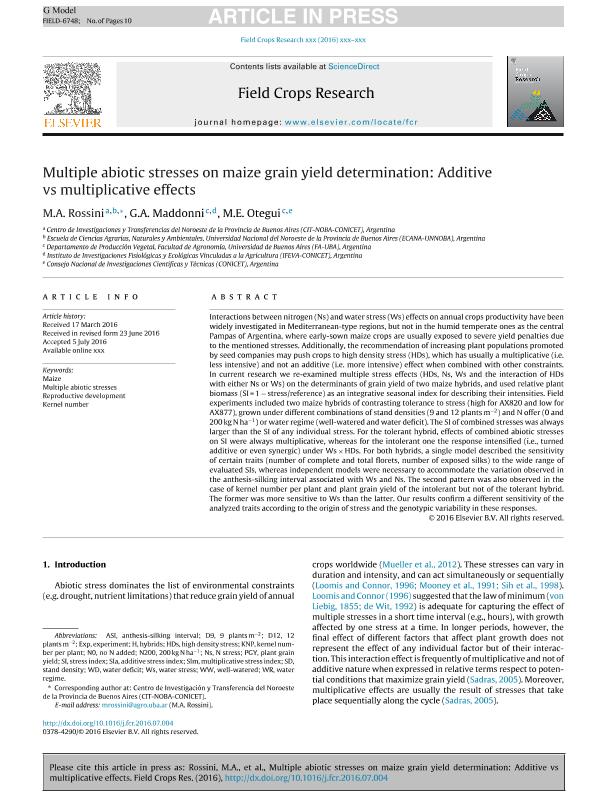Artículo
Multiple abiotic stresses on maize grain yield determination: Additive vs multiplicative effects
Fecha de publicación:
11/2016
Editorial:
Elsevier Science
Revista:
Field Crops Research
ISSN:
0378-4290
Idioma:
Inglés
Tipo de recurso:
Artículo publicado
Clasificación temática:
Resumen
Interactions between nitrogen (Ns) and water stress (Ws) effects on annual crops productivity have been widely investigated in Mediterranean-type regions, but not in the humid temperate ones as the central Pampas of Argentina, where early-sown maize crops are usually exposed to severe yield penalties due to the mentioned stresses. Additionally, the recommendation of increasing plant populations promoted by seed companies may push crops to high density stress (HDs), which has usually a multiplicative (i.e. less intensive) and not an additive (i.e. more intensive) effect when combined with other constraints. In current research we re-examined multiple stress effects (HDs, Ns, Ws and the interaction of HDs with either Ns or Ws) on the determinants of grain yield of two maize hybrids, and used relative plant biomass (SI = 1 − stress/reference) as an integrative seasonal index for describing their intensities. Field experiments included two maize hybrids of contrasting tolerance to stress (high for AX820 and low for AX877), grown under different combinations of stand densities (9 and 12 plants m−2) and N offer (0 and 200 kg N ha−1) or water regime (well-watered and water deficit). The SI of combined stresses was always larger than the SI of any individual stress. For the tolerant hybrid, effects of combined abiotic stresses on SI were always multiplicative, whereas for the intolerant one the response intensified (i.e., turned additive or even synergic) under Ws × HDs. For both hybrids, a single model described the sensitivity of certain traits (number of complete and total florets, number of exposed silks) to the wide range of evaluated SIs, whereas independent models were necessary to accommodate the variation observed in the anthesis-silking interval associated with Ws and Ns. The second pattern was also observed in the case of kernel number per plant and plant grain yield of the intolerant but not of the tolerant hybrid. The former was more sensitive to Ws than the latter. Our results confirm a different sensitivity of the analyzed traits according to the origin of stress and the genotypic variability in these responses.
Palabras clave:
KERNEL NUMBER
,
MAIZE
,
MULTIPLE ABIOTIC STRESSES
,
REPRODUCTIVE DEVELOPMENT
Archivos asociados
Licencia
Identificadores
Colecciones
Articulos(IFEVA)
Articulos de INST.D/INV.FISIOLOGICAS Y ECO.VINCULADAS A L/AGRIC
Articulos de INST.D/INV.FISIOLOGICAS Y ECO.VINCULADAS A L/AGRIC
Articulos(SEDE CENTRAL)
Articulos de SEDE CENTRAL
Articulos de SEDE CENTRAL
Citación
Rossini, Maria de Los Angeles; Maddonni, Gustavo Angel; Otegui, Maria Elena; Multiple abiotic stresses on maize grain yield determination: Additive vs multiplicative effects; Elsevier Science; Field Crops Research; 198; 11-2016; 280-289
Compartir
Altmétricas




